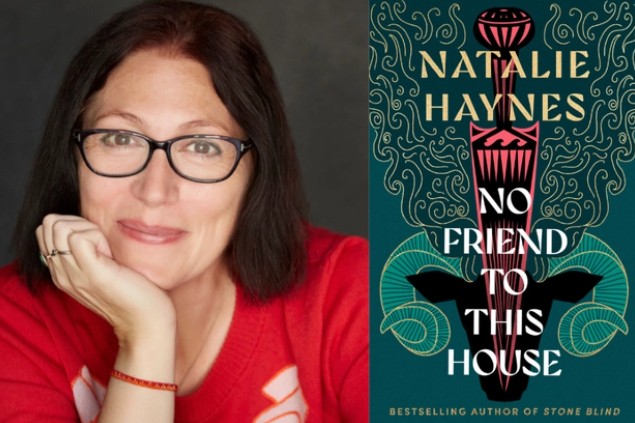It has been many years since I last visited Malvern Theatres for a performance, something I used to do a lot when my beloved Aunty Maria was alive. She loved the theatre, and we would often go and see performances, especially Shakespeare plays (we even saw Patrick Stewart in “Hamlet” at the Royal Shakespeare Company in Stratford Upon Avon in the 1980s before he was Jean-Luc Picard in Star Trek). In the year 2000 we saw the late great actor Charlton Heston in a play with his wife called “Love Letters”, we even got to meet him after the show, and he signed my programme. It was in the days before we all had cameras on our phones, so I didn’t get a photo with him – hard as that is to imagine today!
So when my friend Simon said that Natalie Hayes was performing at Malvern Theatres and asked if I would like to go with him, I jumped at the chance, as I know of Natalie mainly from her BBC Radio 4 show “Natalie Haynes Stands Up for the Classics.” As someone who’s #OpenlyNeurodivergent and processes information differently, I absolutely love how she makes the ancient world accessible without dumbing it down. She’s got this brilliant ability to weave comedy into classical education that reminds me of why I fell in love with storytelling in the first place. And here is something about me that I’ve never spoken about before, I love Greek mythology, but have always “masked” this interest because when I was a child at school, I was bullied about it.
I was not disappointed last night as Natalie’s performance style had me completely engaged and laughing throughout. There’s something about her delivery that’s both scholarly and utterly entertaining. As someone who does keynote speaking myself, I have massive respect for presenters who can make complex subjects accessible while maintaining their integrity and passion.
The Book: Flipping the Script on Heroic Narratives
But here’s the thing that got me from the moment Natalie started speaking. This isn’t just another retelling of Jason and the Argonauts, one of my favourite Greek mythology stories. Natalie Hayes has done something far more subversive and interesting. She’s taken a story we all think we know and completely flipped the script by giving voices to all the women who’ve been relegated to footnotes in the traditional versions.
“No Friend to This House” focuses on the myth of Medea, told through multiple female perspectives – goddesses, mortals, even a crow gets a voice in this narrative. It’s like she’s taken the traditional male-dominated heroic tale and asked: “But what were the women actually thinking and feeling during all this supposed heroism?”
The way Natalie Haynes described her approach reminded me so much of my own writing process. She talked about how she digs deep into the source material, finding the gaps where women’s voices should be, and then filling those spaces with rich, complex characters who refuse to be silenced. It’s methodical, it’s passionate, and it’s unapologetically feminist – everything I try to bring to my own work.
The Emotional Core: Ancient Stories, Personal Resonance
What really struck me was when she discussed the Golden Fleece itself as being not just a magical object, but as something with its own tragic backstory involving sacrifice and loss. As someone who’s experienced profound loss myself, I was moved by how she handles themes of grief and sacrifice throughout the narrative.
There’s a rawness there that resonates deeply, a refusal to gloss over the painful parts of the story. When she read excerpts from the book, particularly Medea’s sections, you could hear a pin drop in the theatre. Haynes doesn’t shy away from the darker aspects of these myths – the betrayal, the violence, the impossible choices that characters like Medea face.
Contemporary Relevance: Why Ancient Myths Still Matter
The evening wasn’t just about the book, though. Natalie Haynes spoke beautifully about the enduring relevance of these ancient myths, and I couldn’t help but draw parallels to my own field. In cyber security we’re constantly dealing with age-old patterns of human behaviour. Social engineering, for instance, is just ancient manipulation tactics dressed up with modern technology. Similarly, these Greek myths continue to resonate because they’re fundamentally about human nature: love, betrayal, ambition, revenge.
As someone who’s spent years advocating for diversity and inclusion in the cyber security industry, I was absolutely captivated by how Natalie Haynes challenges the narrative. She asks the questions that matter: What about Medea’s story? What about the other women affected by Jason’s so-called heroic quest?
The Takeaway: Stories That Change How We See the World
For anyone thinking about picking up “No Friend to This House,” do it. If you’re anything like me, someone who appreciates when traditional narratives get the shake-up they deserve, you’ll find yourself completely absorbed. And if you get the chance to see Natalie Haynes speak live, grab it with both hands.
I found myself thinking about all the untold stories in my own industry. How many brilliant women in cyber security have had their contributions overlooked or minimised? How many diverse voices have been pushed to the margins of our professional narratives? That’s the real power of what Natalie Haynes does, she doesn’t just retell old stories, she reminds us to question whose voices we’re listening to and whose we might be missing. In cyber security, in literature, in life – we all need to be asking: whose story isn’t being told?
Final Verdict
If I have one tiny criticism, it’s that the evening flew by too quickly. I could have listened to Natalie Haynes discuss mythology and storytelling for hours. But then again, leaving your audience wanting more is never a bad thing. It’s the kind of experience that stays with you long after you’ve left the theatre, making you reconsider everything you thought you knew about heroes, villains, and the stories we tell ourselves about both.
It only remains for me to say a very big thank you to my lovely friend Simon for not only suggesting this to me, but for playing chauffeur and giving me a lift to and from the theatre. I discovered we have Greek mythology in common, and we both love the theatre, so I feel like I now have a new #TheatreBuddy for future performances. It was an absolutely brilliant evening, and I’ll be first in the queue for whatever Natalie Haynes does next. And the margherita pizza I had at Malvern Theatres last night was absolutely yummy! I could smell it cooking where Simon and I were sat, and as I hadn’t had a chance to have anything to eat since a small bowl of cereal at lunchtime I couldn’t resist getting one.
“No Friend to this House” is available to buy now on Amazon.

























